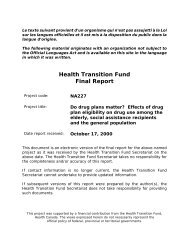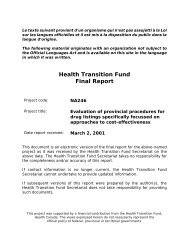- Page 1 and 2: Le texte suivant provient d’un or
- Page 3 and 4: Executive Summary Table of Contents
- Page 5 and 6: Executive Summary In March, 1999 th
- Page 7 and 8: nursing role varies within and acro
- Page 9 and 10: There were commonalities and differ
- Page 11 and 12: Recommendation 2 It is recommended
- Page 13 and 14: Project Team This research project
- Page 15 and 16: Acronyms AARN ACHHR Alberta Associa
- Page 17 and 18: skill transfer, etc.) have been sat
- Page 19 and 20: SD4 Dissemination plan. 1.2 Rationa
- Page 21 and 22: influence role performance and job
- Page 23 and 24: to balance institutional care with
- Page 25 and 26: 2.2 Determination of Terms and Defi
- Page 27 and 28: 2.3 Population and Sample (see SD1
- Page 29 and 30: Newfoundland, data collection was c
- Page 31 and 32: 2.7 Overview of Restrictions and Li
- Page 33 and 34: Manitoba has enacted similar legisl
- Page 35 and 36: Table 1 - Titles for Registered Nur
- Page 37: Table 2 - Summary of Scope of Pract
- Page 41 and 42: 3.1.4 Summary The extension of auth
- Page 43 and 44: autonomous nature of extended/expan
- Page 45 and 46: managed, nurses were expected to wo
- Page 47 and 48: Expected core competencies for regi
- Page 49 and 50: The final scenario relates to regis
- Page 51 and 52: Limited support mechanisms in place
- Page 53 and 54: Development of an Experiential Base
- Page 55 and 56: working in urban areas. Regardless
- Page 57 and 58: The fact that patients continued to
- Page 59 and 60: oles was reflected in increased uti
- Page 61 and 62: The barriers to full-utilization an
- Page 63 and 64: 84% of patient visits lasted less t
- Page 65 and 66: in the on-site data collection phas
- Page 67 and 68: minimum standards for entry into th
- Page 69 and 70: Canada. In particular, there was no
- Page 71 and 72: Nurse participants in the on-site d
- Page 73 and 74: Appendix A - Sources Regulatory Con
- Page 75 and 76: Hicks, C. & Hennessy, D. (1998). A
- Page 77 and 78: Beddome, G., Clarke, H. F., and Why
- Page 79 and 80: generalist. Educational Innovations
- Page 81 and 82: Stanhope, M. K. (1995). Primary hea
- Page 83 and 84: Scotia. (1997). Guidelines for regi
- Page 85 and 86: Pitblado, J. R. & Pong, R. W. (1999
- Page 87 and 88: Supporting Document 1 (SD1) Profile
- Page 89 and 90:
Profile of the Extended/Expanded Nu
- Page 91 and 92:
Profile of the Extended/Expanded Nu
- Page 93 and 94:
Profile of the Extended/Expanded Nu
- Page 95 and 96:
Profile of the Extended/Expanded Nu
- Page 97 and 98:
Profile of the Extended/Expanded Nu
- Page 99 and 100:
Profile of the Extended/Expanded Nu
- Page 101 and 102:
Profile of the Extended/Expanded Nu
- Page 103 and 104:
Profile of the Extended/Expanded Nu
- Page 105 and 106:
Profile of the Extended/Expanded Nu
- Page 107 and 108:
Profile of the Extended/Expanded Nu
- Page 109 and 110:
Profile of the Extended/Expanded Nu
- Page 111 and 112:
Profile of the Extended/Expanded Nu
- Page 113 and 114:
Profile of the Extended/Expanded Nu
- Page 115 and 116:
Profile of the Extended/Expanded Nu
- Page 117 and 118:
Profile of the Extended/Expanded Nu
- Page 119 and 120:
Profile of the Extended/Expanded Nu
- Page 121 and 122:
Profile of the Extended/Expanded Nu
- Page 123 and 124:
Profile of the Extended/Expanded Nu
- Page 125 and 126:
Profile of the Extended/Expanded Nu
- Page 127 and 128:
Profile of the Extended/Expanded Nu
- Page 129 and 130:
Profile of the Extended/Expanded Nu
- Page 131 and 132:
Profile of the Extended/Expanded Nu
- Page 133 and 134:
Profile of the Extended/Expanded Nu
- Page 135 and 136:
Profile of the Extended/Expanded Nu
- Page 137 and 138:
Profile of the Extended/Expanded Nu
- Page 139 and 140:
Profile of the Extended/Expanded Nu
- Page 141 and 142:
Profile of the Extended/Expanded Nu
- Page 143 and 144:
Profile of the Extended/Expanded Nu
- Page 145 and 146:
Profile of the Extended/Expanded Nu
- Page 147 and 148:
Profile of the Extended/Expanded Nu
- Page 149 and 150:
Profile of the Extended/Expanded Nu
- Page 151 and 152:
Profile of the Extended/Expanded Nu
- Page 153 and 154:
Profile of the Extended/Expanded Nu
- Page 155 and 156:
Profile of the Extended/Expanded Nu
- Page 157 and 158:
Profile of the Extended/Expanded Nu
- Page 159 and 160:
Profile of the Extended/Expanded Nu
- Page 161 and 162:
Profile of the Extended/Expanded Nu
- Page 163 and 164:
Profile of the Extended/Expanded Nu
- Page 165 and 166:
Profile of the Extended/Expanded Nu
- Page 167 and 168:
Profile of the Extended/Expanded Nu
- Page 169 and 170:
Profile of the Extended/Expanded Nu
- Page 171 and 172:
Profile of the Extended/Expanded Nu
- Page 173 and 174:
Profile of the Extended/Expanded Nu
- Page 175 and 176:
Profile of the Extended/Expanded Nu
- Page 177 and 178:
Profile of the Extended/Expanded Nu
- Page 179 and 180:
Profile of the Extended/Expanded Nu
- Page 181 and 182:
Profile of the Extended/Expanded Nu
- Page 183 and 184:
Profile of the Extended/Expanded Nu
- Page 185 and 186:
Profile of the Extended/Expanded Nu
- Page 187 and 188:
Profile of the Extended/Expanded Nu
- Page 189 and 190:
Profile of the Extended/Expanded Nu
- Page 191 and 192:
Profile of the Extended/Expanded Nu
- Page 193 and 194:
Profile of the Extended/Expanded Nu
- Page 195 and 196:
Profile of the Extended/Expanded Nu
- Page 197 and 198:
Profile of the Extended/Expanded Nu
- Page 199 and 200:
Profile of the Extended/Expanded Nu
- Page 201 and 202:
Profile of the Extended/Expanded Nu
- Page 203 and 204:
Profile of the Extended/Expanded Nu
- Page 205 and 206:
Profile of the Extended/Expanded Nu
- Page 207 and 208:
Profile of the Extended/Expanded Nu
- Page 209 and 210:
Profile of the Extended/Expanded Nu
- Page 211 and 212:
Profile of the Extended/Expanded Nu
- Page 213 and 214:
Profile of the Extended/Expanded Nu
- Page 215 and 216:
Profile of the Extended/Expanded Nu
- Page 217 and 218:
Profile of the Extended/Expanded Nu
- Page 219 and 220:
Profile of the Extended/Expanded Nu
- Page 221 and 222:
Profile of the Extended/Expanded Nu
- Page 223 and 224:
Profile of the Extended/Expanded Nu
- Page 225 and 226:
Profile of the Extended/Expanded Nu
- Page 227 and 228:
Profile of the Extended/Expanded Nu
- Page 229 and 230:
Profile of the Extended/Expanded Nu
- Page 231 and 232:
Supporting Document 2 Evaluation of
- Page 233 and 234:
There is an increasing trend in the
- Page 235 and 236:
and in some cases superior to, trad
- Page 237 and 238:
5 The current study will address th
- Page 239 and 240:
7 Instruments The interviews/observ
- Page 241 and 242:
9 Ethical Considerations Participan
- Page 243 and 244:
11 increase NP status and value. Th
- Page 245 and 246:
13 Brief Overview of Research Study
- Page 247 and 248:
15 INSTITUTE FOR THE ADVANCEMENT OF
- Page 249 and 250:
17 Signature Page Title of Project:
- Page 251 and 252:
Duration of participant’s involve
- Page 253 and 254:
Appendix C: Interview Schedules 21
- Page 255 and 256:
23 8. How has this role changed the
- Page 257 and 258:
25 8. How has this role changed the
- Page 259 and 260:
27 Patient/Client Survey Part I: Ce
- Page 261 and 262:
29 Part II: Satisfaction We are int
- Page 263 and 264:
31 CODE #_______ OBSERVATION TIME__
- Page 265 and 266:
33 CODE #_______ OBSERVATION TIME__
- Page 267 and 268:
Appendix F: Letter of Support 35
- Page 269 and 270:
Table of Contents 1. Physicians’
- Page 271 and 272:
Physicians’ Perceptions of Extend
- Page 273 and 274:
attributed to either inadequacies o
- Page 275 and 276:
Many of the physician participants
- Page 277 and 278:
Illustrative Quotes 1. “I definit
- Page 279 and 280:
area of concern voiced by physician
- Page 281 and 282:
1.2.1.2 Implications for physicians
- Page 283 and 284:
14. In the outpost community the nu
- Page 285 and 286:
2. “In many cases, it’s the oth
- Page 287 and 288:
3. “People are just happy to have
- Page 289 and 290:
4. “There was a great need to hav
- Page 291 and 292:
findings are summarized according t
- Page 293 and 294:
3. “It is just one of the things
- Page 295 and 296:
Nurses’ Perceptions of Extended/E
- Page 297 and 298:
2.1 Practical Knowing Self-confiden
- Page 299 and 300:
Illustrative Quotes 1. “As time g
- Page 301 and 302:
participants felt that additional k
- Page 303 and 304:
practice, balancing collaborative a
- Page 305 and 306:
16. “The people that are working
- Page 307 and 308:
nearby. . . . I like being able to
- Page 309 and 310:
9. “I certainly don’t want to g
- Page 311 and 312:
8. “I think that the people reali
- Page 313 and 314:
2.4 Barriers to and Facilitators of
- Page 315 and 316:
8. “The physicians have been very
- Page 317 and 318:
nursing role was strongly influence
- Page 319 and 320:
2.4.2.2 Policy Implications Partici
- Page 321 and 322:
14. “There is definitely a space
- Page 323 and 324:
54 II. Patients’ Perceptions of N
- Page 325 and 326:
56 there are other possible factors
- Page 327 and 328:
eing completed in less than 15 minu
- Page 329 and 330:
60 for relevant history, diagnostic
- Page 331 and 332:
62 The NP ordered relevant diagnost
- Page 333 and 334:
64 The third case captures how the
- Page 335 and 336:
Appendix G - 1: Patient Survey Inst
- Page 337 and 338:
Use the following scale to rate the
- Page 339 and 340:
Thank you for taking the time to fi
- Page 342 and 343:
73 CODE #_______OBSERVATION TIME___
- Page 344 and 345:
75 CODE #_______OBSERVATION TIME___
- Page 346 and 347:
Dissemination Final Report The Natu
- Page 348:
Conferences < Ontario Association o




